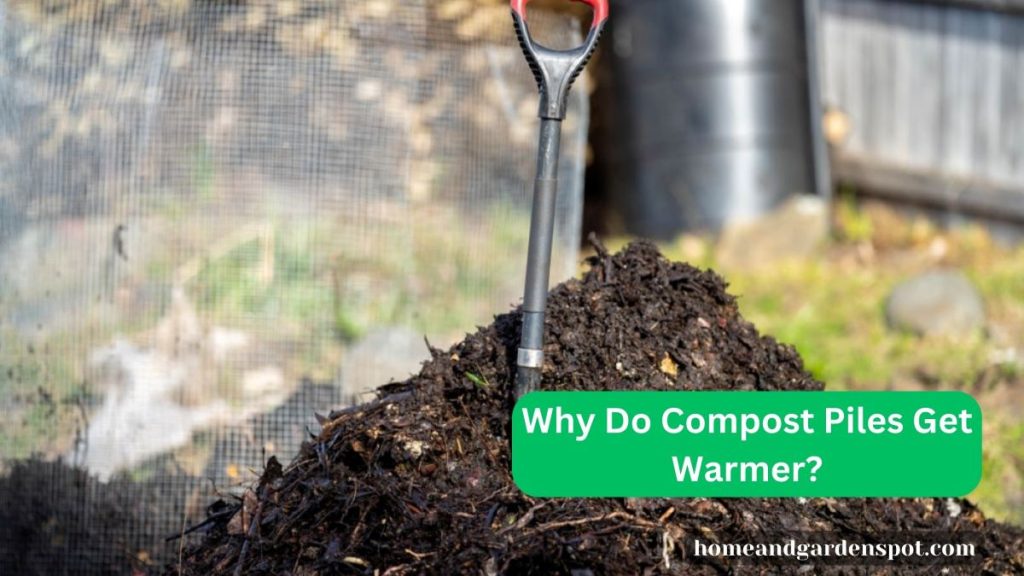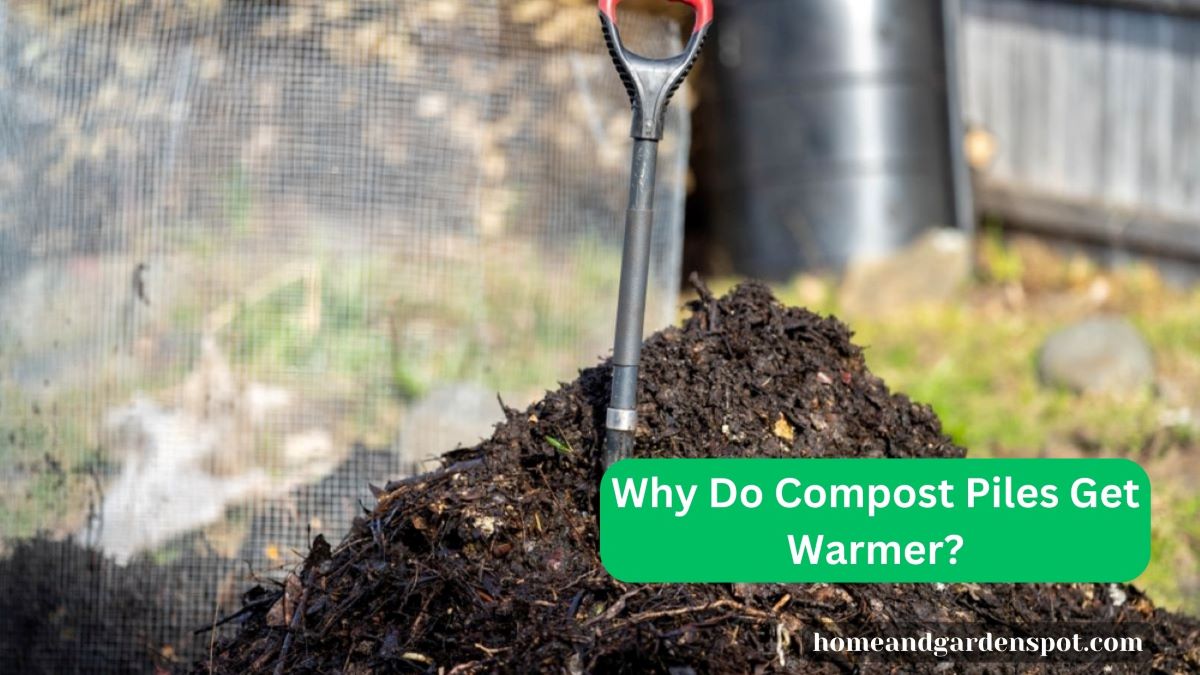In composting, temperature is not merely a matter of comfort or meteorological curiosity; it is a critical factor that can determine the success or failure of the entire process.
Compost piles have a remarkable ability to generate heat, and this heat, while intriguing in its own right, holds tremendous importance for those who seek to harness the power of decomposition to enrich their gardens.
To understand this phenomenon, we must first answer a fundamental question: Why do compost piles get warmer?
The heat generated in compost piles is primarily due to the activity of microorganisms. These tiny creatures, including bacteria and fungi, feed on the organic matter and release heat as a byproduct.
The heat produced by these microorganisms warms up the compost pile.

Reasons Why Compost Heaps Get Hot
Compost heaps, seemingly inert collections of organic waste, transform into dynamic and heat-generating environments due to the intricate interplay of microbial activity.
The quest to understand why compost heaps get hot leads us on a journey through the following reasons:
1. Metabolic Processes of the Microorganisms cause it.
Composting is a microbial-driven process where countless microorganisms, including bacteria and fungi, serve as the unsung heroes.
As these microorganisms break down organic matter for sustenance, they undergo metabolic processes that not only produce the coveted humus-rich compost but also generate substantial amounts of heat as a natural by-product.
2. The Decomposition Process Thrives on Microbial Diversity
In the compost heap, many bacteria and fungi partake in this vital task. They utilize organic materials as their primary energy source, a process that emits heat due to their metabolic activities.
As these microorganisms multiply, so does the heat they collectively generate.
3. Not All Microorganisms Share the Same Temperature Preferences
In a compost pile, as the temperature rises, the types of microbes responsible for initiating the decomposition process give way to a different variety.
This temperature-dependent succession of microbial populations is crucial to the escalating heat within the compost pile.
Microbial activity unfolds in three distinct phases, each characterized by different temperature ranges:
- Cool Temperature Microbes (Psychrophiles)
These hardy microorganisms kickstart decomposition at low temperatures, remaining effective even as low as 28°F (-2°C). However, they thrive optimally around 55°F (13°C), gradually yielding to the next group of decomposers as temperatures rise.
- Mid-Temperature Microbes (Mesophiles)
Operating in the temperature range of 50-115°F (10-46°C), mesophiles take the reins of decomposition. In many home compost piles, mesophilic activity dominates, steadily breaking down organic matter.
- High-Temperature Microbes (Thermophiles)
Should your compost pile reach higher temperatures, typically between 115-160°F (46-71°C), thermophilic microorganisms become the show’s stars. This stage, often known as “hot composting,” is celebrated among gardeners for its efficiency in rapidly producing compost.
Should My Compost Be Hot?
The temperature of a compost pile can rise significantly during the decomposition process. The optimum temperature for composting is around 160 degrees Fahrenheit (71 degrees Celsius).
In hot climates, compost piles that haven’t been turned recently can reach even higher temperatures. These high temperatures are necessary to destroy pathogens and weed seeds in the compost.
However, excessively high temperatures can also kill beneficial microbes and compromise some of the organic properties of the compost.
Therefore, it’s not necessary for your compost pile to be hot, but it’s a good sign that the decomposition process is working well.
If your compost pile is not hot, it may indicate that the pile is too small or too dry. You can add more organic matter to the pile or water it to increase moisture content.
Benefits of a Warmer Compost Pile
A compost pile that maintains higher temperatures offers a range of advantages, making it a valuable asset for gardeners and environmental enthusiasts.
Here are the key benefits of a warmer compost pile which you can compare to the benefits of hot vs. cold composting to determine the best approach for your composting needs:
1. Accelerated Breakdown of Organic Materials
Elevated temperatures within the compost pile significantly accelerate the decomposition of organic materials.
Microbial activity thrives in a warm environment, leading to faster breakdown of compostable materials such as kitchen scraps, yard waste, and plant matter.
2. Pathogen and Weed Seed Reduction
The heat generated in a warmer compost pile can effectively kill pathogens and weed seeds present in the organic materials.
This not only reduces the risk of introducing harmful elements into your garden but also minimizes the potential for weed growth when using the finished compost.
3. High Temperatures Kill Harmful Pathogens
Warmer compost piles reach temperatures that are lethal to many harmful pathogens, including bacteria and parasites.
These high temperatures effectively sterilize the compost, making it safer to handle and apply to gardens, reducing the risk of disease transmission.
4. Safer Compost for Garden Use
Compost produced in a warmer pile is less likely to harbor harmful microorganisms that can negatively impact plant health.
Gardeners can use this compost with confidence, knowing that it is less likely to introduce diseases or pests to their garden beds.
5. Enhanced Nutrient Release
The increased microbial activity and higher temperatures in a warmer compost pile result in a more efficient breakdown of organic matter.
This process leads to the enhanced release of nutrients from the decomposing materials, making them readily available for plant uptake.
In addition, a warmer compost pile promotes nutrient release and helps retain these nutrients within the compost itself.
The higher temperatures contribute to the stabilization of nutrients in a form that is less prone to leaching, ensuring that the compost remains a valuable source of nutrients for plant
How Long Does Compost Stay Hot?
A well-designed compost system will heat up to mid-temperatures of around 104-122°F (40-50°C) within 2 to 3 days.
Next, it could remain at this medium temperature range for up to 15 days and continue to decompose thanks to the mesophilic bacteria.
Once the pile’s temperature reaches about 100 degrees F, turn the pile again, and temperatures will again rise to 130 degrees F or higher as the organic materials in the pile break down.
How to Maintain Your Compost Pile
1. Measure the Temperature Daily
Use a compost thermometer to measure the pile’s temperature daily. Record the readings in a notebook or spreadsheet to understand how different ingredients and methods affect the pile’s temperature.
2. Size It Right
Compost piles require mass to self-insulate and maintain high temperatures during thermophilic composting.
The minimum recommended size is 3 x 3 x 3 feet (1 cubic yard or 1 cubic meter), while larger sizes inhibit airflow to the center of the pile.
3. Turn, Mix, and Water
As supplies of food, air, and water are exhausted, temperatures drop.
To encourage higher temperatures and more rapid decomposition, turn the pile to aerate it, mix undecomposed ingredients from the outside into the center, and add moisture when necessary.
4. Destroy Pathogens and Weed Seeds
Most plant pathogens are destroyed if temperatures remain between 130 and 140 degrees Fahrenheit (54 to 60 degrees Celsius) for 72 hours.
Weed seeds are destroyed if exposed to temperatures above 131 degrees Fahrenheit (55 degrees Celsius) for 72 hours.
5. Avoid Overheating
Heating your pile above 170 degrees Fahrenheit (77 degrees Celsius) for more than a few hours is not recommended as it inhibits microbial activity and shuts down the decomposition process.
If the pile becomes too hot, turn it to aerate the core and release heat build-up.
Conclusion
The compost pile temperature is warm because of the pivotal role of microbial activity, which helps maintain a balanced carbon-to-nitrogen ratio and ensures adequate oxygen, moisture, and insulation.
However, the importance of managing temperature for efficient composting cannot be overstated.
A warmer compost pile accelerates decomposition, effectively controls pathogens, reduces weed seed presence, and enhances nutrient availability, yielding nutrient-rich compost that can enrich garden soil and reduce organic waste.

Leave a Reply